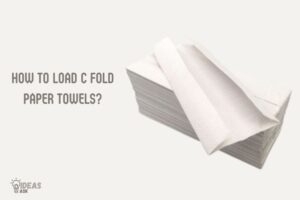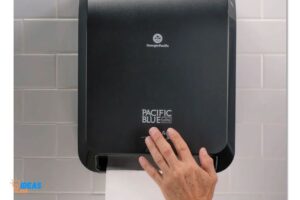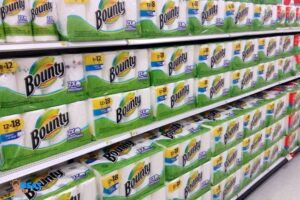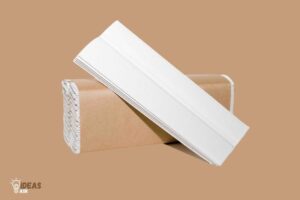What to Use Instead of Paper Towels? Cloth napkins
Instead of paper towels, you can use reusable, eco-friendly alternatives like microfiber cloths, Swedish dishcloths, unpaper towels, and cloth napkins.
Paper towels are single-use, disposable products that contribute to environmental waste and deforestation.
To reduce the negative impact on the environment and save money, it’s essential to switch to reusable and sustainable alternatives.
These alternatives can effectively clean, wipe, and absorb spills while being washable and long-lasting.
Switching to reusable alternatives not only helps you save money in the long run, but it also significantly reduces the environmental impact.
By using eco-friendly options like microfiber cloths, Swedish dishcloths, unpaper towels, and cloth napkins, you’ll contribute to sustainable living and reduce your carbon footprint. These products are easy to clean, maintain
7 Eco-friendly Alternatives of Paper Towels
| Alternative | Description | Benefits |
|---|---|---|
| Cloth Towels | Reusable, washable towels made of materials like cotton. | Eco-friendly, cost-effective, easy to clean. |
| Microfiber Cloths | High-absorbency synthetic cloths for cleaning surfaces. | Reusable, efficient cleaning, quick-drying. |
| Sponges | Absorbent cleaning tools made from cellulose or foam. | Reusable, versatile, inexpensive. |
| Rags or Old T-shirts | Repurposed fabric from old clothes or textiles. | Free, eco-friendly, customizable size. |
| Beeswax Wraps | Reusable, washable food wraps made of beeswax-coated fabric. | Eco-friendly, replaces plastic wrap, reusable. |
| Silicone Lids | A durable and reusable alternative for covering food. | Eco-friendly, dishwasher-safe, air-tight seal. |
| Swedish Dishcloths | Absorbent, reusable, and quick-drying cloths. | Eco-friendly, versatile, cost-effective. |
Key Takeaway

Five Surprising Facts About Paper Towel Usage and Alternatives
Introduction To Alternatives To Paper Towels
The Environmental Impact Of Paper Towels
Paper towels continue to be one of the major contributors to environmental degradation.
Let’s take a closer look at their negative impact:
- Paper towels use trees, water, and energy to produce and dispose of them. It’s estimated that over 254 million tons of paper towels are produced every year, contributing to deforestation and greenhouse gas emissions.
- Furthermore, paper towels are often used once and then thrown away. This leads to waste buildup in landfills and contributes to water and air pollution.
- Lastly, most paper towels cannot be recycled, due to contamination with food waste or other substances. This makes them a single-use item, adding to the overall waste of resources.
Importance Of Using Eco-Friendly Alternatives
Using eco-friendly alternatives to paper towels is one way we can all contribute to reducing environmental damage.
Here are the benefits:
- Eco-friendly alternatives are made from sustainable materials like bamboo, hemp, or organic cotton. They do not emit harmful chemicals nor require the use of pesticides or fertilizers, saving our environment from further degradation.
- They can be washed and reused multiple times, meaning less waste buildup in landfills. This habit reduces pollution and conserves our natural resources.
- Opting for eco-friendly alternatives supports brands that prioritize sustainability and ethical production practices.
Brief Overview Of Alternatives
There are several eco-friendly alternatives to paper towels.
Here are the top options to consider:
- Microfiber cloths: These are made from synthetic materials that effectively trap and absorb moisture and dirt. They are machine washable and can be reused multiple times.
- Unpaper towels: These are cloth-based towels that function the same as paper towels, but with the added benefit of being reusable and sustainable.
- Washcloths: Use washcloths as an alternative to paper towels when cleaning surfaces or drying hands. They can be washed and reused multiple times.
- Bamboo towels: These towels are made from bamboo and can be used as a replacement for paper towels. They are sturdy, absorbent and can be washed and reused multiple times.
By choosing eco-friendly alternatives to paper towels, we can significantly reduce the environmental impact of our daily activities. So, make a difference today with a simple switch to sustainable materials.
Eco-Friendly Alternatives To Paper Towels
Are you tired of using paper towels? Then it’s time to switch to eco-friendly alternatives.
Here are some options you might want to try:
Cloth Towels: The Ultimate Reusable Option
Cloth towels are the ultimate reusable option for those who want to reduce waste. You can use them for cleaning, wiping, and drying, and then toss them into the wash when you’re done.
Some of the benefits of using cloth towels include:
- They help you save money over time
- They are durable and can last for years
- They are available in a variety of sizes and textures
- They are a better alternative for the environment compared to paper towels
Bamboo Towels: The Sustainable And Soft Option
Bamboo towels are made from bamboo fiber, a sustainable resource that doesn’t require pesticides or fertilizers. These towels are soft, absorbent, and strong, making them great for cleaning up spills and messes.
Some of the benefits of using bamboo towels are:
- They are biodegradable and won’t harm the environment
- They are naturally anti-bacterial and hypoallergenic
- They are soft and gentle on the skin
- They are reusable and easy to clean
Swedish Dishcloths: The Absorbent And Versatile Option
Swedish dishcloths are versatile cloths that can be used for cleaning, wiping, and scrubbing. They are made from a blend of cellulose and cotton, making them absorbent and durable.
Here are some benefits of using swedish dishcloths:
- They are biodegradable and compostable
- They are washable and can be reused up to 50 times
- They are available in a variety of colors and designs
- They are versatile and can be used for different purposes
Beeswax Wraps: The Reusable And Compostable Option
Beeswax wraps are a great alternative to plastic wrap. They are made from organic cotton infused with beeswax, jojoba oil, and resin. These wraps can be used to cover food items, bowls, and jars.
Here are some benefits of using beeswax wraps:
- They are reusable and can be washed and reused several times
- They are compostable and biodegradable
- They keep food fresh and are an effective way to reduce plastic use
- They are available in different sizes and patterns
Air Dryers: The Hygienic And Efficient Option
Air dryers are another alternative to paper towels. They are commonly found in public bathrooms, but can also be used in homes.
Some benefits of using air dryers include:
- They are quick and efficient at drying hands
- They are hygienic and prevent the spread of bacteria
- They are reusable and do not create waste
- They are available in different sizes and styles
There are many eco-friendly alternatives to paper towels. Each option has its benefits and can help reduce waste and save you money in the long run. Consider giving one or more of these alternatives a try and see which one works best for you.
How To Choose The Best Alternative For Your Needs
Consider Your Budget, Lifestyle, And Use Case
When it comes to choosing an alternative to paper towels, it’s important to think about your budget, lifestyle, and how you plan to use the product.
Here are some key points to consider:
- Budget: Some alternatives to paper towels may be more expensive upfront, but they can save you money in the long run. Consider how much you’re willing to spend on a reusable product versus continually purchasing disposable paper towels.
- Lifestyle: If you’re always on-the-go, a portable option like a microfiber cloth might be more practical. If you’re eco-conscious, consider options made from sustainable materials.
- Use case: Different alternatives to paper towels may be more suitable for specific uses. For example, if you’re cleaning up spills in the kitchen, you might prefer an absorbent cloth or sponge.
Understanding The Cleaning And Care Requirements Of Each Alternative
It’s essential to understand the cleaning and care requirements of any alternative to paper towels to ensure that you’re getting the most out of your product and maintaining its longevity.
Here are some key points to keep in mind:
- Read the labels: Always check the care instructions on the product label before using or washing it.
- Machine washable vs. hand wash only: Some alternatives, like microfiber cloths or cotton towels, can be machine-washed, while others may require hand-washing only.
- Drying: Some alternatives can be machine-dried, while others need to air-dry or be hung up to dry.
Assessing The Pros And Cons Of Each Option
Lastly, it’s essential to weigh the pros and cons of each option before making a decision.
Here are some examples:
- Cotton towels: Good absorbency and durability, but can potentially harbor bacteria if not washed properly.
- Microfiber cloths: Super absorbent and versatile, but can be more expensive than other options.
- Sponge cloths: Made from eco-friendly materials, but may deteriorate faster than other options.
When choosing an alternative to paper towels, it’s important to consider your budget, lifestyle, and use case, understand its cleaning and care requirements, and weigh the pros and cons of each option carefully.
Diy Alternatives To Paper Towels
What to use instead of paper towels: diy alternatives to paper towels
Are you tired of spending money on paper towels that add up to your expenses and contribute to environmental pollution?
Fortunately, using diy alternatives to paper towels is more accessible than ever, and they are more sustainable and budget-friendly. In this blog post, we will explore different diy options that you can use instead of paper towels.
Keep on reading to find out!
Making Your Own Cloth Towels
Making your own cloth towels is a simple and cost-effective alternative to paper towels. Not only are they durable and reusable, but also they are available in a variety of materials like flannel, terry cloth, and linen.
Here are some key points to consider when making your own cloth towels:
- Select the fabric material of your choice depending on your preferences
- Cut the fabric into your desired size, we recommend using 12×12 inch dimensions.
- Overlock the edges of the fabric using a sewing machine to prevent fraying
- Fold or roll the cloth towels and store them in a designated area in your kitchen.
Diy Beeswax Wraps: A Simple Tutorial
Beeswax wraps are an eco-friendly alternative to plastic wrap that helps keep food fresh. These wraps are reusable, and they can last for up to a year with proper care.
Here are some key points to help create your beeswax wraps:
- You will need 100% cotton fabric, beeswax pellets, jojoba oil, and parchment paper.
- Cut the fabric into your desired size, usually 14×14 inch dimensions.
- Preheat your oven to 300 degrees fahrenheit.
- Place the fabric, beeswax pellets, and jojoba oil on top of the parchment paper.
- Put the parchment paper in the oven and wait for the pellets to melt.
- Take the wrapping out of the oven and let it cool down.
- Once cooled, start using the beeswax wrap to cover your food.
How To Sew Your Own Unpaper Towels
If you’re looking for an alternative to paper towels that’s not only greener but stylish too, making your unpaper towels is an ideal solution. With these instructions, sewing your unpaper towels is simple, and it’s a perfect way to repurpose your old clothes.
Here are some key points to keep in mind when sewing your unpaper towels:
- Pick a fabric material of your choice, considering the thickness and absorbency of the material.
- Cut the fabric into your desired size, typically ranging from 8×8 to 12×12 inches.
- Sew pairs of fabrics together with the right sides facing inward and leaving an opening on one side.
- Turn the fabric right side out, and sew along the opening with a topstitch.
- Once done with all the fabrics, fold them and stack them in your kitchen.
Tips On Upcycling Old Fabrics
When opting for eco-friendly diy alternatives to paper towels, upcycling your old fabrics benefits both your environment and your wallet.
Here are some key points to keep in mind when upcycling old fabrics:
- Look for old fabrics in your closets like clothes, towels, and bed linen.
- Cut the fabrics into your desired size, considering the absorbency of the material.
- If the material is thin, layer multiple fabrics together to create thickness.
- Overlock or sew the edges of the fabric to prevent fraying.
- Once done, store them in a prominent place in your kitchen.
Shifting from using paper towels to eco-friendly diy alternatives is a great way to reduce waste, cut costs and help save the planet.
Being environmentally friendly doesn’t have to be difficult or costly. Try out the diy alternatives mentioned above, and you’ll notice a considerable difference in the long run.
FAQ On Reusable Alternatives of Paper Towels
How Can I Replace Paper Towels?
You can replace paper towels with reusable alternatives such as cloth towels, napkins, or microfiber cloths.
What Are The Benefits Of Using Reusable Alternatives?
Using reusable alternatives can save money, reduce waste, and help the environment by reducing the need for single-use products.
How Do I Clean And Maintain Reusable Alternatives?
Reusable alternatives can be cleaned in the washing machine with warm water and mild detergent. Avoid using fabric softener to maintain absorbency.
Where Can I Buy Reusable Alternatives?
Reusable alternatives can be purchased at many stores, online retailers, and specialty shops. Look for options made from sustainable materials.
Conclusion
As we have seen, using paper towels might be convenient for cleaning up messes or spills, but it definitely comes at a cost that we cannot underestimate. Luckily, there are several alternatives that are not only environmentally friendly, but also more cost-effective.
From reusable cloth towels to compostable sponges, there are plenty of options to choose from. By making the switch from paper towels to any of these alternatives, we can make a significant difference in reducing waste and saving resources. Additionally, we can inspire others to do the same, which could lead to a bigger impact.
Remember, small changes can make a huge difference in the long run. Taking small steps to live a more sustainable life is essential for our environment and our future generation. So let’s make the switch and do our part to make a difference!






